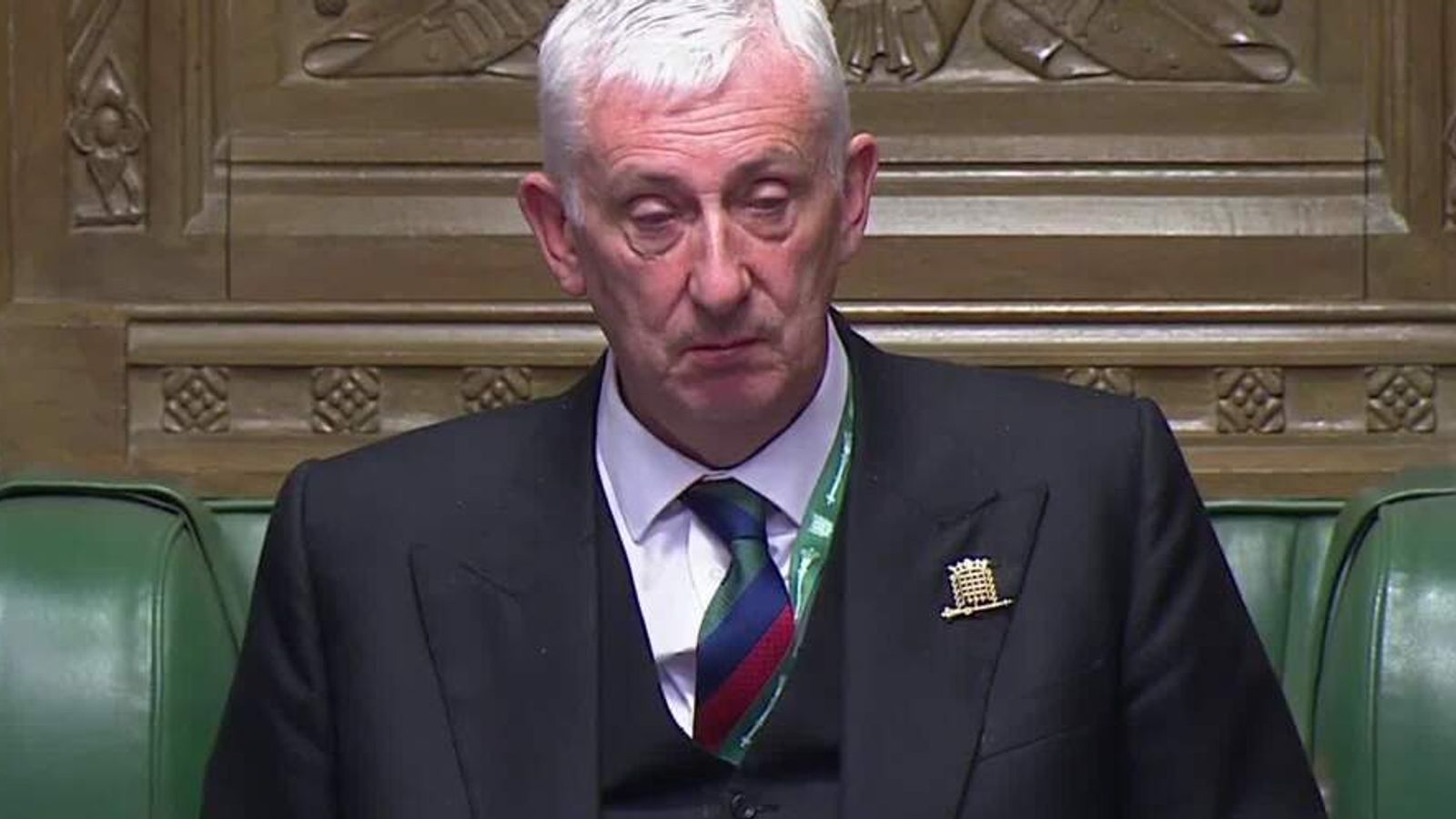After his tearful apology to MPs on Wednesday evening, at the height of the Commons furore over his controversial Israel-Hamas ceasefire ruling, Sir Lindsay Hoyle came out fighting in his bid to save his job.
Yes, he apologised once again for what he admitted had been a mistake.
But he also took the fight to his critics by spelling out his concerns about the threat to MPs’ safety while the Middle East is such a highly charged issue.
Politics latest: Rishi Sunak criticises handling of Gaza ceasefire vote
“I never, ever want to go through a situation where I pick up a phone to find a friend, on whatever side, has been murdered by a terrorist,” Sir Lindsay said, in a clear reference to the murder of Tory MP Sir David Amess in 2021.
He also said he didn’t want to see another attack on Parliament, a reference to the 2017 terror attack when a car was driven into pedestrians, killing four pedestrians and injuring more than 50.
“I won’t share the details, but the details of the things that have been brought to me are absolutely frightening for all members of the House, on all sides,” he said. “I have a duty of care and I say that. If my mistake is looking after members, I am guilty.”
He also revealed he had “serious meetings” on Wednesday with police chiefs on threats to politicians as a general election approaches. “I don’t want anything to happen again,” he added.
So his defence is that in agreeing to put all three ceasefire options – from the SNP, Labour and the government – to a vote on Wednesday he acted for the best of motives. And that defence appears to be gaining support.
Rishi Sunak, always anxious not to offend his pesky backbenchers, in this case those demanding Sir Lindsay’s removal, said his handling of the ceasefire vote was “concerning”, because the “usual processes” were changed.
Please use Chrome browser for a more accessible video player
But the prime minister did also echo Sir Lindsay’s warning about intimidation of MPs or aggressive behaviour by extremists, calling it “a very slippery slope”.
Earlier, Sir Lindsay won significant backing from a number of senior figures. Cabinet minister Michael Gove declared in an interview with The Sun newspaper: “You’ve got to respect the ref, even if you disagree with his decisions.”
Commons leader Penny Mordaunt – in her latest impressive audition for the Tory leadership – switched her attack from the previous evening’s brutal onslaught on Sir Lindsay to an attack on Labour instead.
The highly respected former defence secretary Ben Wallace, in a rare intervention these days, said powerfully on X: “I have served under three speakers. Lindsay Hoyle is head and shoulders above the rest.
“He is fair, kind and a protection of backbenchers. He is not a bully, nor a grandstander nor pompous. He has my full support.”
Bully, grandstander, pompous? Who could Mr Wallace possibly mean?
And in a Sky News interview, the Liberal Democrat leader Sir Ed Davey said Sir Lindsay had behaved professionally and acted in good faith. He also – correctly – accused the SNP of playing political games.
The two SNP motions tabled for the party’s opposition day, on a Gaza ceasefire and Labour’s ditched £28bn green investment plan, were obviously a bid to expose divisions in Sir Keir Starmer‘s party.
And so despite all the holier-than-thou protestations of the SNP’s Westminster leader Stephen Flynn, he was indeed – as he protested – “stitched up”.
Please use Chrome browser for a more accessible video player
But as one Tory put it: “He poked a stick at a snake and the snake bit him.”
Of the 67 names on the Early Day Motion declaring no confidence in the Speaker, 28 are SNP MPs, which may put more Tory MPs off adding their name in the hours and days ahead.
And do EDMs matter? Not really. They’re essentially parliament’s graffiti wall, a means for backbenchers to praise their local football team for reaching the third round of the FA Cup and trivia like that.
Powerful 1922 Committee could be a big concern for Hoyle backers
The one big worry for Hoyle backers will be the presence of 1922 Committee chairman Sir Graham Brady and all the members of the ’22 executive on the EDM. Did they hatch a plot at their meeting before the full ’22 met on Wednesday evening? Looks like it.
As for the rest, there’s a fair number of the Tories’ mavericks and malcontents, many of whom also want to get rid of Mr Sunak. And one of the MPs, Sir James Duddridge, led the backbench charge to oust John Bercow in 2017, a full two years before he was eventually forced out.
Please use Chrome browser for a more accessible video player
On the other hand, backbencher Philip Davies, who would normally cross a road to join in a political scrap, declared in the Commons: “The Speaker is a good, decent and honourable man, and we are lucky to have him as the Speaker of the House of Commons.
“He has my 100% full support and my total confidence. He made a mistake yesterday and, unlike most politicians, he has been big enough to come to the House and admit that.”
And he added: “I’m pretty certain that he retains the full confidence of the overwhelming majority of people on both sides of the House.”
Read more:
The real impact of the chaos in the Commons
Starmer denies threatening Speaker over ceasefire vote
Can MPs force Sir Lindsay out of his job?
Be the first to get Breaking News
Install the Sky News app for free
Not the overwhelming majority, by any means, given what many senior ministers have told Sky News in private. But at the moment, those MPs who support Sir Lindsay probably outnumber those who want him out.
In 2015, when William Hague and Mr Gove engineered a Commons vote to remove Mr Bercow, voting was 228 to 202 in his favour, prompting him to smirk at Mr Hague with a defiant stare.
The result could be a similar narrow win for Sir Lindsay if there’s eventually a vote on removing him. He remains a popular figure, though he has severely tested that popularity this week.
His contrition and humility have probably helped him in his fightback. But his allies claim he’s resilient and he’s clearly prepared to keep fighting as he battles to save his job.





